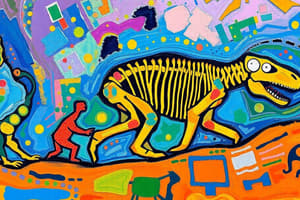Podcast
Questions and Answers
What type of evidence supports the idea that species change over time?
What type of evidence supports the idea that species change over time?
- Only structural traits
- DNA similarities
- Fossil records
- All of the above (correct)
Which field of study focuses on the development of organisms to trace evolutionary relationships?
Which field of study focuses on the development of organisms to trace evolutionary relationships?
- Genetics
- Paleontology
- Anatomy
- Embryology (correct)
What does molecular evidence provide in the context of evolution?
What does molecular evidence provide in the context of evolution?
- Comparative analysis of skeletal structures
- Proof of species extinction
- Insights into genetic similarities between species (correct)
- Visual representation of evolutionary trees
How can fossils indicate evolutionary changes over time?
How can fossils indicate evolutionary changes over time?
Which statement about common ancestors is accurate?
Which statement about common ancestors is accurate?
What type of evidence has shown that modern whales evolved from land mammals?
What type of evidence has shown that modern whales evolved from land mammals?
Which of the following is NOT a method used to determine the relatedness of organisms?
Which of the following is NOT a method used to determine the relatedness of organisms?
What type of evolutionary evidence can transitional characters provide?
What type of evolutionary evidence can transitional characters provide?
What is the primary material in which most fossils form?
What is the primary material in which most fossils form?
What principle is used to date rocks and fossils based on their depth?
What principle is used to date rocks and fossils based on their depth?
What happens during the formation of a cast fossil?
What happens during the formation of a cast fossil?
What are transitional fossils important for?
What are transitional fossils important for?
Which of the following describes how fossils tend to change as they age?
Which of the following describes how fossils tend to change as they age?
What is the fossil record comprised of?
What is the fossil record comprised of?
What process occurs to a dead organism that contributes to fossil formation?
What process occurs to a dead organism that contributes to fossil formation?
Which of these factors is NOT involved in fossil formation?
Which of these factors is NOT involved in fossil formation?
Flashcards are hidden until you start studying
Study Notes
Fossil Formation
- Fossils are remains or imprints of organisms
- Fossils are often found in sedimentary rock
- Sedimentary rock forms when particles of sand or soil are deposited in layers
- Fossils form when a dead organism is covered by sediment
- Minerals in sediment replace the organism's body with minerals that harden
- This process creates a cast fossil
The Fossil Record
- The fossil record refers to all the fossils that have been discovered
- Examining the fossil record helps scientists understand life's history on Earth
- Gaps exist in the fossil record: fossils that have not been discovered
- Transitional fossils fill in gaps in the fossil record
Evidence for Evolution
- Fossils found in newer layers of Earth's crust are more similar to present-day organisms than fossils from older layers
- Structural data, DNA, developmental patterns, and fossils support the idea that populations change over time
- Related organisms share structural traits
- DNA comparison can show similarities that indicate shared ancestry
- Embryology is the study of development and how organisms develop in similar ways can indicate shared ancestry
Modern Whales
- Fossil and DNA evidence suggest that modern whales evolved from hoofed mammals that lived on land
- Scientists have studied transitional characters of extinct species to see how changes happened
- Fossil skeletons suggest how land mammals might have changed to aquatic whales
- Molecular evidence shows that the DNA of whales and hoofed mammals is similar
Studying That Suits You
Use AI to generate personalized quizzes and flashcards to suit your learning preferences.




